Featured blog posts
Step-by-Step Guide to Divorce Mediation Without Lawyers
Divorce is often seen as a complex, drawn-out process filled with tension, high costs, and lengthy court battles. However, there’s an alternative path that is gaining popularity for its simplicity and cost-effectiveness: divorce mediation without lawyers.
This method empowers couples to resolve their disputes amicably, without the intervention of costly attorneys. If you’re looking to save both time and money while navigating the difficult waters of separation, this step-by-step guide is for you.
Why Consider Mediation Without Lawyers for Divorce?
Divorce mediation is a process where an independent third-party mediator helps separating couples come to a mutual agreement regarding key issues like asset division, child custody, and financial support.
But why choose divorce mediation without lawyers? One of the most significant reasons is cost savings. Without expensive lawyer fees, mediation becomes a more affordable option.
It also typically involves less conflict, as both parties work toward a mutually beneficial outcome rather than fighting over legal details in court.
In contrast to traditional litigation, mediation fosters collaboration rather than confrontation. Without lawyers steering the conversation toward litigation, you and your spouse can engage in constructive discussions with the goal of achieving a fair settlement that works for both parties. It is an empowering process where you maintain control over decisions that will affect your future.
Divorce Mediation vs. Traditional Legal Process
[caption id="attachment_2632" align="alignright" width="300"]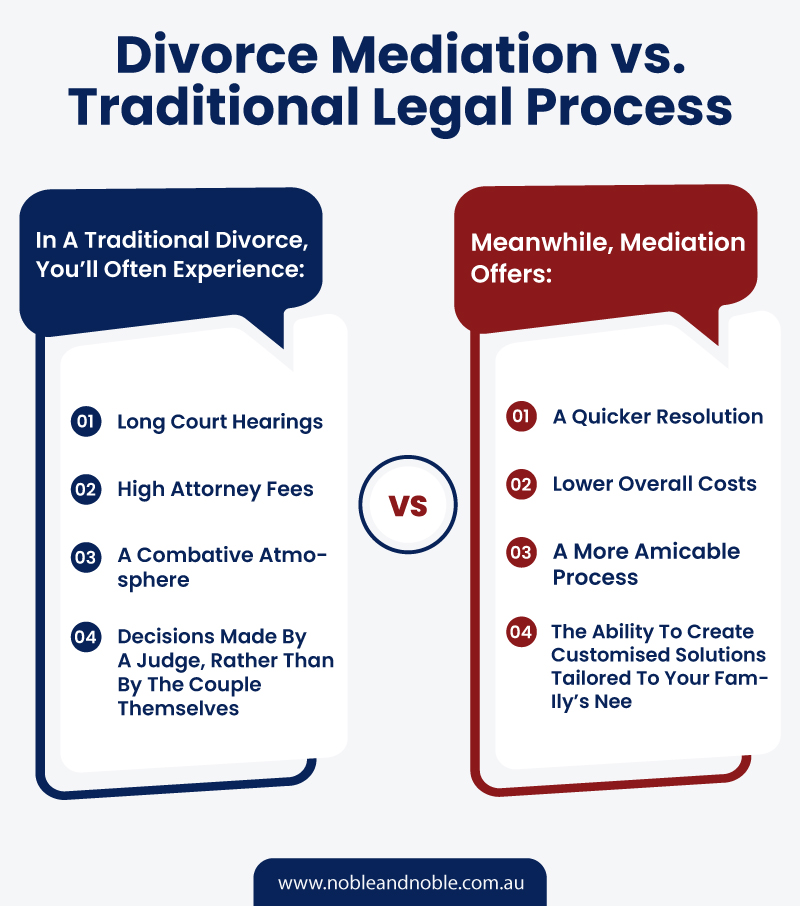 Divorce Mediation vs. Traditional Legal Process[/caption]
Divorce Mediation vs. Traditional Legal Process[/caption]
While the traditional legal process requires each spouse to retain a lawyer, file petitions, and present their case before a judge, divorce mediation without lawyers is an entirely different approach. Rather than focusing on winning or losing, mediation focuses on collaboration and compromise.
In a traditional divorce, you’ll often experience:
- Long court hearings
- High attorney fees
- A combative atmosphere
- Decisions made by a judge, rather than by the couple themselves
Meanwhile, mediation offers:
- A quicker resolution
- Lower overall costs
- A more amicable process
- The ability to create customised solutions tailored to your family’s needs
In addition, mediation is private and confidential, meaning personal issues are kept out of public records. This contrasts sharply with court cases, where proceedings are often available to the public.
How to Choose the Right Mediator?
One of the most crucial steps in divorce mediation without lawyers is selecting the right mediator. A mediator’s role is to remain neutral, facilitate open communication, and guide both parties toward a fair agreement. Since you won’t have lawyers involved, the choice of mediator becomes even more significant.
Here are key qualities to look for in a mediator:
- Experience in divorce mediation
- An understanding of family law (even if you aren't hiring a lawyer, knowledge of the law is important)
- Strong communication skills and the ability to manage conflict
- A neutral stance that ensures fairness for both parties
Before selecting a mediator, you may want to have an initial consultation to ensure they’re the right fit. It’s crucial that both you and your spouse feel comfortable with the mediator, as their role will be essential in facilitating a successful outcome.
Step-by-Step Mediation Process
[caption id="attachment_2630" align="alignright" width="300"]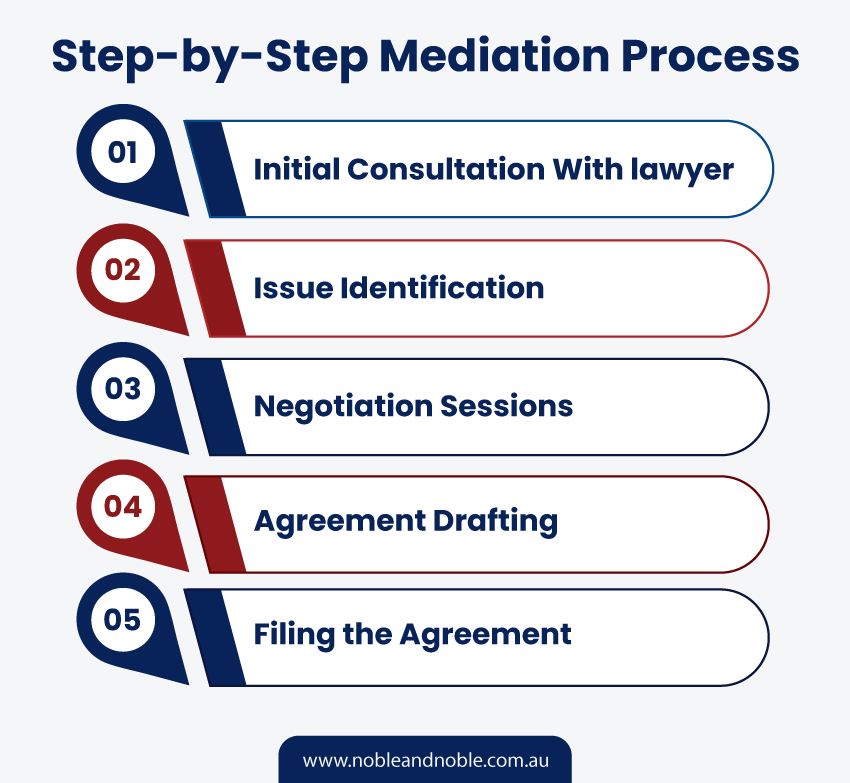 Mediation Process[/caption]
Mediation Process[/caption]
The process of divorce mediation without lawyers is relatively straightforward. Here’s how the typical mediation unfolds:
Initial Consultation: Both parties meet with the mediator for an initial discussion. In this session, the mediator explains the process, outlines the goals of mediation, and answers any questions. You’ll both need to agree to work together in good faith throughout the process.
Issue Identification: Next, you’ll identify the main issues that need to be resolved, such as property division, child custody, and spousal support. The mediator will help both parties clarify their positions and list the concerns that must be addressed.
Negotiation Sessions: Over the course of several sessions, the mediator will facilitate negotiations on each issue. This phase of mediation requires patience, cooperation, and a willingness to compromise. The mediator’s job is to guide these discussions and help resolve conflicts when they arise.
Agreement Drafting: Once the issues are resolved, the mediator will help draft an agreement that outlines the terms of the divorce. This document will include decisions on asset division, child care arrangements, and any financial obligations. It’s important that both parties thoroughly review the agreement to ensure it reflects their wishes.
Filing the Agreement: After both parties have signed the agreement, it can be filed with the court. While no lawyers are necessary during mediation, you may still want to have the final agreement reviewed by a legal professional before submitting it to ensure all legal requirements are met.
Legal Documentation Without a Lawyer
Filing legal paperwork can seem intimidating, but even in divorce mediation without lawyers, it’s entirely possible to handle the documentation yourself. In most cases, the mediator will assist in providing the necessary forms and guiding you through the filing process.
Once your mediation agreement is complete, you’ll need to file it with your local court to finalise the divorce. Here are the typical steps:
- Complete the necessary divorce forms (often available online through your local court's website).
- Attach the signed mediation agreement to your paperwork.
- File your divorce petition along with the mediation agreement in court.
- Once the paperwork is reviewed and approved, the court will issue a divorce decree based on the terms of the agreement.
This streamlined process eliminates the need for multiple court hearings, saving you both time and stress.
Benefits of Divorce Mediation Without Lawyers
Choosing divorce mediation without lawyers comes with a multitude of benefits that can make the divorce process smoother and more manageable:
- Cost-Effective: With no need to pay attorney fees, mediation is significantly cheaper than traditional divorce proceedings.
- Faster Resolution: Since you won’t be waiting for court dates or working around busy lawyer schedules, mediation usually results in a much quicker resolution.
- Less Stress: Divorce is stressful enough without adding legal battles into the mix. Mediation fosters a cooperative atmosphere, reducing conflict and tension.
- Control Over the Outcome: Mediation allows you and your spouse to create a custom agreement that works best for your family’s needs, rather than leaving decisions up to a judge.
- Confidentiality: Your personal issues remain private, whereas in a court battle, many details become part of the public record.
These advantages are especially appealing for couples who want to maintain a level of control and civility during the divorce process.
Taking the Next Step Towards an Amicable Divorce
If you’re considering divorce mediation without lawyers, you’re already on the path to a more peaceful, cost-effective, and efficient divorce process. While the idea of navigating a divorce without legal representation may seem daunting, with the right mediator and a willingness to compromise, it’s entirely possible to resolve even complex issues amicably.
Ultimately, mediation empowers you and your spouse to maintain control over your future, ensuring that the decisions made are in the best interest of everyone involved—especially if children are a factor. By choosing mediation over traditional litigation, you’re opting for a process that prioritises collaboration, reduces stress, and minimises financial burden.
FAQs
What are the main advantages of divorce mediation without lawyers?
Divorce mediation without lawyers offers lower costs, faster resolutions, less stress, and allows both parties to retain control over the outcome, as opposed to traditional divorce litigation.
How do I find a good mediator for divorce mediation without lawyers?
Look for mediators with experience in family law, strong communication skills, and a reputation for neutrality. A good mediator helps foster productive discussions and ensures a fair agreement.
Is it possible to handle legal documentation without a lawyer?
Yes, the mediator can guide you through the process of filing necessary paperwork. It may be beneficial to have the final agreement reviewed by a legal professional before filing.
How long does divorce mediation typically take?
The process length varies depending on the complexity of the issues, but divorce mediation without lawyers usually takes several weeks to a few months, much faster than litigation.
Can I still consult a lawyer if I choose mediation without legal representation?
Absolutely. While lawyers don’t need to be involved in mediation, you can always consult one if you have questions or need a final review of your mediation agreement.
Is divorce mediation without lawyers appropriate for every couple?
Mediation works best when both parties are willing to collaborate and compromise. It may not be suitable for cases involving domestic violence or if one party refuses to cooperate.
You may also like to know more information about the
Mediation Without Lawyers: Affordable and Efficient Dispute Resolution
In today’s fast-paced world, finding effective solutions to legal disputes without the need for formal court proceedings is increasingly popular. Mediation without lawyers is quickly becoming a go-to option for people looking to save time, reduce costs, and resolve their conflicts amicably. The approach bypasses much of the complexity of traditional litigation and offers parties a more collaborative path toward finding mutually agreeable solutions.
Mediation without legal representation doesn’t mean that disputes become harder to resolve. Quite the opposite, actually. With the help of an experienced mediator, individuals can effectively settle disagreements, from family issues to business conflicts, without ever needing to hire a lawyer. But how exactly does this process work, and why are so many people opting for lawyer-free mediation? Let’s dive deeper.
What is Mediation Without Lawyers?
At its core, mediation without lawyers is a process where disputing parties work with a neutral third-party mediator to reach a voluntary settlement. Unlike court cases, where a judge imposes a decision, mediation encourages dialogue and cooperation. The mediator doesn’t act as a judge or arbitrator but instead helps both sides communicate, ensuring the conversation remains respectful and productive.
One key difference here is that neither party has a lawyer representing them during the mediation process. This makes the process more affordable and less formal, as it removes the need for complex legal strategies and costly legal fees. Without the adversarial nature that lawyers often bring to the table, parties often feel more in control of their outcomes.
Why More People Are Choosing Mediation Without Legal Representation?
Many individuals are turning to mediation as an alternative to costly legal battles, and for good reason. Mediation without lawyers comes with a host of benefits:
- Cost Savings: One of the most obvious reasons for choosing mediation without lawyers is the substantial financial savings. Traditional legal disputes can quickly rack up thousands of dollars in legal fees. In contrast, mediating a conflict without attorneys means paying only for the mediator's services, which tend to be much less expensive.
- Faster Resolutions: Litigation can drag on for months or even years. By contrast, mediation often leads to quicker resolutions. Without the bureaucratic delays of the court system or the back-and-forth negotiations typical between lawyers, mediation sessions can resolve disputes in a fraction of the time.
- Flexibility and Control: In court, the final decision is in the hands of a judge, which can sometimes feel unfair or out of one’s control. Mediation without lawyers empowers the individuals involved to have a say in the outcome, allowing them to shape their own agreement based on their needs.
- Reduced Stress: The legal system is notorious for its complexity and stress. Mediation without legal representation simplifies the process, fostering an environment where both parties can engage in open dialogue and work toward an amicable solution. By sidestepping lengthy courtroom battles, the emotional toll of the dispute is significantly reduced.
- Preserved Relationships: Since mediation is a more collaborative and less adversarial process, it can be especially beneficial in situations where maintaining a relationship is important. Family mediation, in particular, can help preserve healthy communication between parties, which is vital when children are involved.
How to Start the Mediation Process Without a Lawyer?
[caption id="attachment_2626" align="alignright" width="300"]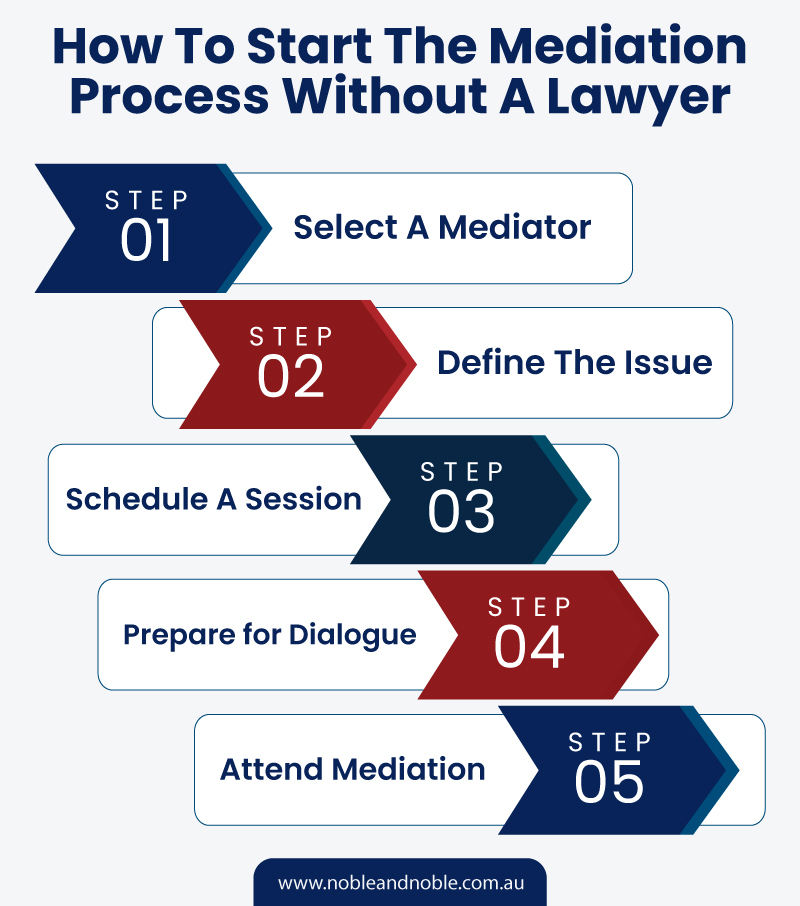 Mediation Process Without a Lawyer[/caption]
Mediation Process Without a Lawyer[/caption]
Starting the mediation process without legal representation might seem daunting at first, but it's relatively straightforward. The first step is selecting an experienced mediator who is skilled in the area of your dispute. For example, if the issue is related to family law (such as a divorce or child custody), a mediator with experience in this field will be a better fit.
Key Steps to Begin Mediation:
- Select a Mediator: Research qualified mediators in your area. Often, mediation centres or online directories can help connect you with an appropriate professional.
- Define the Issue: Both parties must have a clear understanding of the conflict and be willing to compromise. Going into mediation without a firm grasp of what you want to achieve can hinder progress.
- Schedule a Session: Once a mediator is chosen, schedule a meeting. Mediation sessions can take place in-person or remotely, offering flexibility for both parties.
- Prepare for Dialogue: Before the session, it’s essential to organise your thoughts and identify your goals. You should also gather any relevant documents or evidence that might support your position.
- Attend Mediation: During the session, the mediator will facilitate a conversation between both parties. The goal is to identify points of agreement and help resolve areas of conflict.
Throughout this process, the mediator remains a neutral party, guiding discussions but never imposing solutions. The focus is always on cooperation and finding common ground.
The Role of Mediators in Lawyer-Free Disputes
Mediators play a crucial role in mediation without lawyers. Their expertise lies not in the law but in conflict resolution, communication, and negotiation techniques. They are specially trained to remain neutral, ensuring that each party has a voice and that the process remains fair.
The mediator’s main responsibilities include:
- Facilitating Discussions: Helping both parties articulate their concerns without escalating tensions.
- Clarifying Issues: Ensuring that both sides fully understand the points of dispute and are clear about each other’s positions.
- Encouraging Compromise: Finding areas where both parties are willing to make concessions, creating a foundation for agreement.
- Ensuring Fairness: While mediators do not make decisions, they ensure that the mediation is balanced and that neither party dominates the conversation.
By acting as a facilitator rather than an enforcer, the mediator empowers both parties to work collaboratively toward a solution.
How to Prepare for a Mediation Session Without Legal Counsel?
[caption id="attachment_2628" align="alignright" width="300"]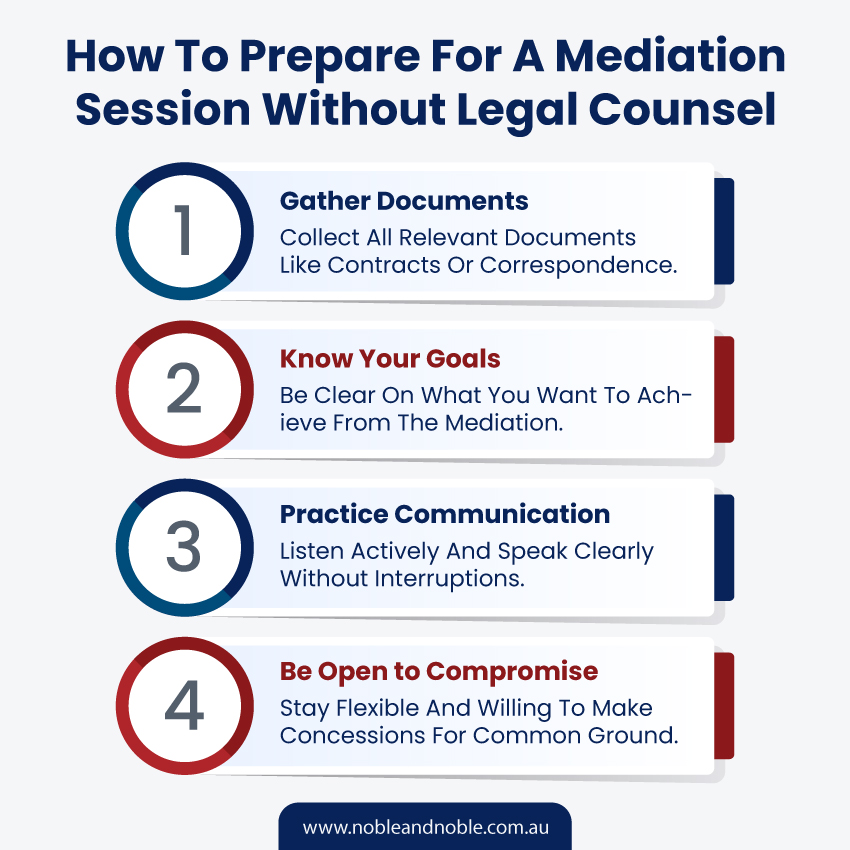 Mediation Session Without Legal Counsel[/caption]
Mediation Session Without Legal Counsel[/caption]
Preparing for mediation without legal counsel requires careful planning. Since there won’t be a lawyer present to advocate on your behalf, it's important to be fully prepared. Here’s how you can ensure you’re ready for your mediation session:
- Gather Information: Collect all relevant documents related to your dispute, such as contracts, financial statements, or correspondence.
- Know Your Goals: Understand what you hope to achieve from mediation. Being clear about your desired outcomes helps keep the conversation focused and productive.
- Practise Effective Communication: Active listening and clear communication are essential during mediation. Be ready to listen to the other party’s concerns without interrupting, and articulate your points calmly and clearly.
- Be Open to Compromise: Mediation is about finding common ground. Be prepared to make concessions and remain flexible during the discussions.
By entering mediation well-prepared, you significantly increase your chances of reaching a satisfactory agreement.
Success Stories: Real-Life Examples of Mediation Without Lawyers
Many individuals have successfully navigated mediation without legal representation, achieving positive outcomes while saving both time and money. Here are a few success stories:
- Sarah and John, a divorcing couple, chose mediation instead of hiring lawyers. By working directly with a family mediator, they were able to agree on child custody arrangements and the division of their assets in just two sessions, saving thousands in legal fees.
- In a business dispute, two small business owners reached an agreement over a contract issue through mediation. Without involving lawyers, they resolved their conflict within a week and resumed their professional relationship.
These stories highlight how mediation without lawyers can lead to fast, fair, and affordable resolutions.
Final Thoughts: Mediation as a Modern Alternative to Litigation
As the legal landscape continues to evolve, mediation without lawyers is emerging as an effective, efficient, and cost-saving alternative to traditional litigation. By providing individuals with more control over their disputes and encouraging cooperation over conflict, mediation offers a forward-thinking approach to resolving issues.
Whether you’re facing a family dispute, a business conflict, or any other kind of disagreement, consider mediation without lawyers as a viable path to resolution. The process not only saves time and money but often preserves relationships and promotes healthier, long-term outcomes.
FAQs
What is mediation without lawyers?
Mediation without lawyers is a conflict resolution process where parties work with a neutral mediator to reach an agreement without legal representation.
Why is mediation without lawyers cheaper?
Without the need for expensive legal fees, individuals only pay for the mediator’s services, which are generally much more affordable.
Can mediation work for complex disputes?
Yes, even complex disputes can benefit from mediation, as the process encourages collaboration and compromise, often leading to more creative solutions.
How long does mediation without lawyers typically take?
Mediation is typically much faster than litigation, often resolving in a few sessions, depending on the complexity of the dispute.
Do I need to prepare differently for mediation without a lawyer?
Yes, you need to be more self-reliant, gather all relevant documents, know your goals, and be prepared to communicate effectively during the sessions.
What kind of disputes can be resolved through mediation?
Mediation is suitable for a wide range of disputes, including family matters, business disagreements, workplace conflicts, and more.
You may also like to know more information about the
How Shuttle Mediation Protects Victims in Domestic Abuse Disputes
Handling domestic abuse disputes in a legal setting requires care, expertise, and safety.
For many families, traditional mediation simply isn’t a viable option due to the inherent power imbalances and risk of further emotional harm.
That’s where shuttle mediation comes in as a life-changing alternative, offering a safer space for victims to participate in conflict resolution without facing their abuser directly.
Shuttle mediation for domestic abuse, especially in places like Brisbane, has emerged as an essential tool in modern family law.
This method allows both parties to negotiate, with a mediator shuttling between them to facilitate communication and agreements.
The physical separation provides a crucial layer of protection, helping victims feel safer, and more empowered to seek fair outcomes.
Understanding Domestic Abuse in the Mediation Context
In mediation, the goal is to resolve disputes amicably, but domestic abuse presents unique challenges.
Whether the abuse is physical, emotional, financial, or psychological, it leads to an unequal dynamic between the victim and the abuser.
In such cases, face-to-face mediation can unintentionally recreate these power imbalances, making it difficult for victims to speak freely, let alone negotiate terms that reflect their best interests.
Domestic violence cases often carry deep emotional scars, and in situations where coercion or fear are present, traditional mediation methods can further aggravate these issues.
A victim of abuse might be hesitant to assert their needs due to fear of retaliation, intimidation, or ongoing trauma.
This is where shuttle mediation shines—it eliminates the need for direct interaction between the victim and abuser.
Why Face-to-Face Mediation May Not Be Suitable
[caption id="attachment_2623" align="alignright" width="300"]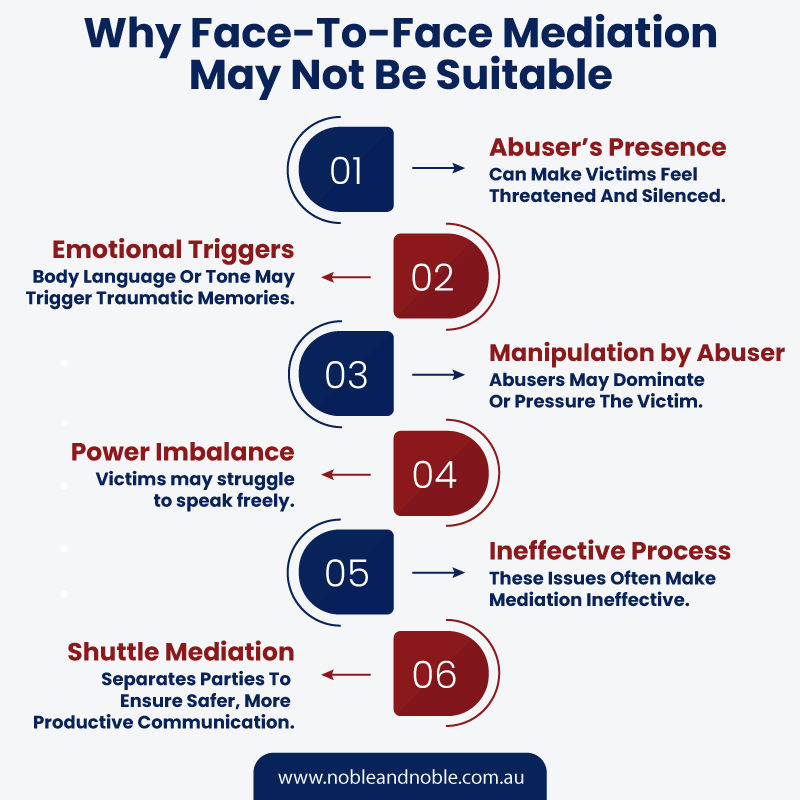 Face-to-Face Mediation[/caption]
Face-to-Face Mediation[/caption]
Traditional mediation typically involves both parties sitting down together with a mediator to negotiate a resolution. While this works well in many situations, it can be harmful in cases involving domestic abuse.
Threatening Presence of the Abuser
- Victims may feel threatened, silenced, or emotionally overwhelmed by the abuser's presence.
Emotional Triggers
- Subtle cues like body language, tone of voice, or eye contact can trigger traumatic memories of abuse.
Manipulation by the Abuser
- Abusers may try to dominate the conversation, apply pressure, or exploit the victim’s vulnerability.
Power Imbalance
- The abuser's presence can create a power imbalance, making it difficult for the victim to participate freely.
Ineffective Mediation
- These dynamics often render face-to-face mediation ineffective in domestic abuse cases.
Shuttle Mediation as a Solution
- Shuttle mediation keeps the parties physically apart, allowing safe and productive communication through the mediator.
Shuttle Mediation as a Safe Alternative
In a shuttle mediation setting, the physical distance between the parties ensures that the victim of domestic abuse is shielded from direct confrontation.
The mediator acts as the intermediary, carrying messages and proposals between the two rooms or even conducting the process virtually through video conferencing.
This separation provides victims with the opportunity to speak openly, without the fear of immediate reprisal from their abuser.
This method is particularly effective because it allows each party to focus solely on the issues at hand rather than their personal safety. Victims of domestic abuse often find it easier to express their concerns, needs, and goals when they are not in the same room as their abuser.
In this way, shuttle mediation offers a unique platform where the mediation process can proceed without the victim being subject to ongoing intimidation.
The Importance of Expertise in Domestic Abuse Mediation
[caption id="attachment_2624" align="alignright" width="300"]
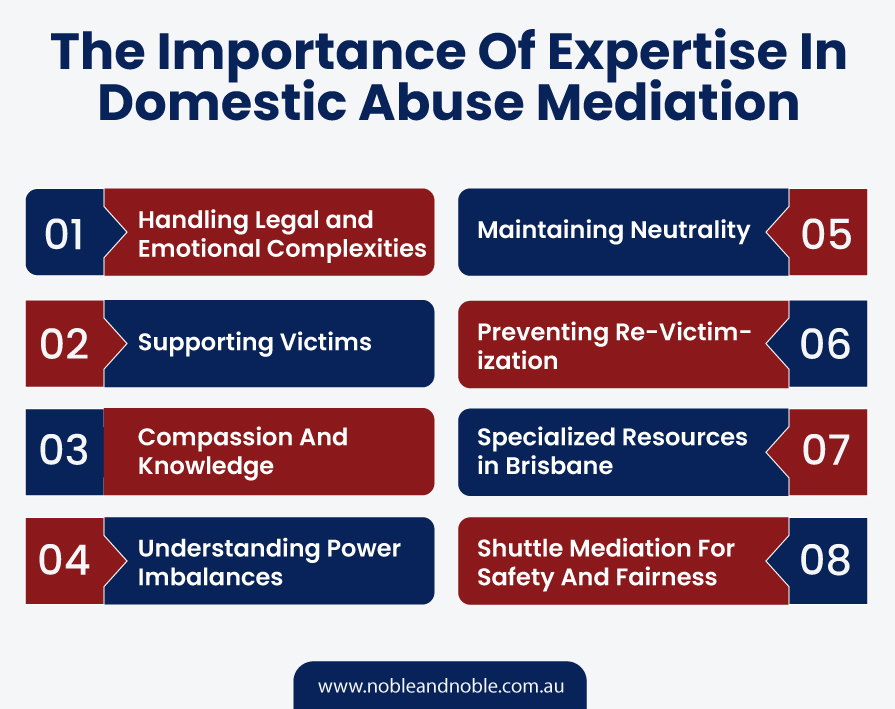 Domestic Abuse Mediation[/caption]
Domestic Abuse Mediation[/caption]Handling Legal and Emotional Complexities
- Skilled mediators must understand both the legal and emotional aspects of domestic violence cases.
- Supporting Victims
- Experienced mediators ensure that victims are supported throughout the entire process.
- Compassion and Knowledge
- Mediators with expertise in domestic abuse provide both the compassion and knowledge necessary to handle delicate situations.
- Understanding Power Imbalances
- A mediator must recognise and address the power dynamics present in domestic abuse situations.
- Maintaining Neutrality
- Professional mediators remain neutral while being sensitive to the subtle dynamics that may emerge during mediation.
- Preventing Re-Victimisation
- A skilled mediator ensures that victims are not further victimised and have a say in shaping the outcome.
- Specialised Resources in Brisbane
- Brisbane offers family mediators who specialise in domestic abuse cases, providing essential resources for these situations.
- Shuttle Mediation for Safety and Fairness
- With the right mediator, shuttle mediation prioritises justice, healing, fairness, and the safety of all parties involved.
How Shuttle Mediation Helps Create Fairer Agreements?
Shuttle mediation is not just about providing physical safety—it’s also about ensuring fairness in outcomes.
The power imbalance inherent in domestic abuse situations can skew negotiations in favour of the abuser, particularly if the victim feels coerced into agreeing to terms that are not in their best interest.
However, the shuttle mediation format helps to level the playing field by giving both parties the space to negotiate through a neutral third party.
For instance, victims often need extra time to process proposals and think through their responses, free from the immediate pressure of their abuser.
The mediator can serve as a buffer, allowing them to formulate their positions and advocate for their needs. This not only makes the process more comfortable for the victim but also helps produce agreements that are fairer and more equitable in the long run.
In shuttle mediation, there is also less opportunity for one party to dominate the discussion or manipulate the outcome, leading to a more balanced resolution.
This is particularly important in family law, where the long-term well-being of both parties, as well as any children involved, is at stake.
Shuttle Mediation Domestic Abuse Brisbane
Brisbane has seen a rise in demand for shuttle mediation services due to the city's commitment to modern legal solutions for family disputes.
As more families face complex legal battles involving domestic abuse, Brisbane’s mediators have adapted to provide innovative methods like shuttle mediation to meet these needs.
Shuttle mediation allows families to resolve their disputes while keeping victims safe from further harm.
For residents of Brisbane, it is reassuring to know that they have access to highly experienced mediators who specialise in domestic abuse cases.
These professionals offer a level of expertise that not only protects victims but also ensures that the agreements reached are just, balanced, and sustainable for the future.
Choosing shuttle mediation in domestic abuse situations can lead to more positive outcomes and provide a sense of closure and justice for those involved.
Conclusion
In cases of domestic abuse, the importance of ensuring the victim’s safety cannot be overstated.
Shuttle mediation offers a secure and effective solution, allowing both parties to negotiate without the threat of intimidation or emotional harm.
By providing physical separation and utilising expert mediators, victims of domestic abuse can participate in the mediation process with confidence, knowing that their well-being is prioritised.
In Brisbane, where family law is evolving, shuttle mediation has become a vital tool for resolving disputes fairly and safely.
FAQs
What is shuttle mediation, and how does it work in domestic abuse cases?
Shuttle mediation is a form of mediation where the two parties are kept in separate rooms, and the mediator moves between them to facilitate communication. It provides a safe alternative for domestic abuse cases by preventing direct interaction between the victim and the abuser.
Why is traditional mediation not ideal for domestic abuse disputes?
Traditional mediation often involves face-to-face meetings, which can be intimidating or harmful to the victim. It may exacerbate power imbalances and prevent the victim from advocating for their rights.
How does shuttle mediation ensure fairness in domestic abuse cases?
Shuttle mediation allows victims the space to express themselves without pressure or fear. The mediator ensures balanced communication, helping to prevent the abuser from controlling the process.
Are Brisbane mediators experienced in handling domestic abuse cases?
Yes, many mediators in Brisbane are specifically trained to handle domestic abuse disputes, providing expertise and support throughout the mediation process.
What makes shuttle mediation safer for victims of domestic violence?
By keeping the parties physically separate, shuttle mediation eliminates the risk of intimidation or confrontation, allowing victims to participate in a safer, more controlled environment.
Can shuttle mediation be conducted virtually?
Yes, shuttle mediation can be done virtually, using video conferencing tools to maintain separation while ensuring that both parties can negotiate effectively.
Exploring the Shuttle Mediation Pros and Cons in Family Law
Mediation has become one of the most popular methods for resolving disputes in family law, providing a more amicable and cost-effective alternative to court proceedings. Among the various types of mediation, shuttle mediation has emerged as a powerful tool, particularly in cases where direct communication between parties is either not feasible or not advisable. But is shuttle mediation the right approach for every family dispute? This article will explore the shuttle mediation pros and cons in family law, offering insights into its suitability for different family law situations.
What is Shuttle Mediation?
Shuttle mediation is a form of alternative dispute resolution (ADR) where the disputing parties do not sit in the same room. Instead, the mediator acts as a go-between, moving (or "shuttling") between the parties to facilitate communication and negotiation. This process is often used in family law cases that are high in conflict, such as divorces or custody disputes, where direct communication could escalate tensions.
In contrast to traditional mediation, where parties are encouraged to communicate face-to-face, shuttle mediation offers a safer and less confrontational environment. By separating the parties, the mediator can manage emotions, ensure privacy, and promote a fair negotiation process. This method is frequently applied in family disputes where emotions run high, or in cases of domestic violence where direct interaction would be inappropriate.
The Rise of Shuttle Mediation in Family Law
In recent years, shuttle mediation has become more prevalent as family law cases have grown more complex and emotionally charged. Courts and legal professionals have increasingly recommended shuttle mediation as a preferred method for resolving sensitive disputes without escalating conflicts further.
One of the driving factors behind this rise is the adaptability of shuttle mediation to high-conflict family situations. Whether it’s a bitter divorce or a protracted child custody battle, shuttle mediation allows for a calm, structured approach, offering a middle ground where the focus can remain on resolving the dispute, not on winning a personal battle.
Shuttle Mediation vs. Face-to-Face Mediation in Divorce
[caption id="attachment_2603" align="alignright" width="300"]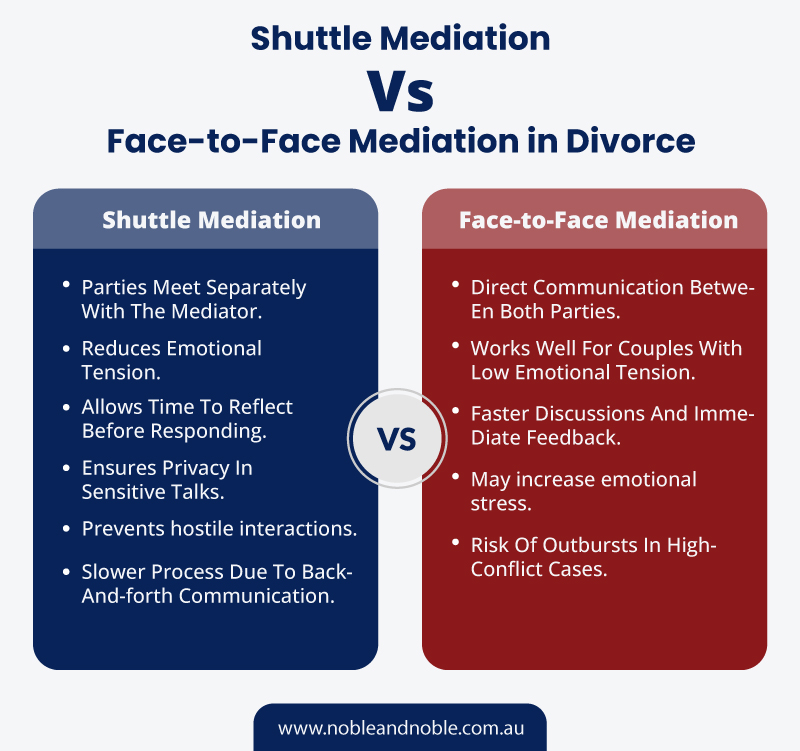 Shuttle Mediation Pros and Cons[/caption]
Shuttle Mediation Pros and Cons[/caption]
Face-to-Face Mediation:
- Both parties are in the same room and engage in direct communication.
- Works well for couples who can communicate openly without significant emotional strain.
- Allows for quicker discussions and real-time feedback.
- May increase emotional tension for some couples.
- Can lead to outbursts or hostility in high-conflict divorces.
Shuttle Mediation:
- The mediator meets with each party separately, avoiding direct confrontation.
- Reduces immediate emotional tension by keeping parties apart.
- Allows individuals time to reflect before responding, promoting more thoughtful communication.
- Ensures privacy for sensitive discussions, as information is shared individually.
- Helps prevent hostile interactions that might derail the process in high-conflict cases.
- Can slow the process, as the mediator relays messages between the parties.
The Role of the Mediator in Shuttle Mediation
The mediator’s role in shuttle mediation is critical. Unlike traditional mediation, where the mediator facilitates a conversation between the parties, in shuttle mediation, the mediator must act as a skilled intermediary. They shuttle between the two parties, accurately relaying messages, proposals, and counteroffers, while ensuring that the integrity of the negotiation process is maintained.
This approach requires the mediator to be:
- Neutral: Ensuring that they do not favour one party over the other.
- Patient: Given the back-and-forth nature of shuttle mediation, the process can take longer. The mediator must be skilled at managing time effectively.
- Clear Communicator: Mediators must be adept at translating the emotions and intentions behind the words of each party to avoid misunderstandings.
Privacy and Confidentiality in Shuttle Mediation
One of the standout advantages of shuttle mediation is the level of privacy and confidentiality it offers. Unlike traditional mediation, where sensitive topics may be discussed openly in front of the other party, shuttle mediation allows each side to have private discussions with the mediator. This is particularly useful in family law cases involving financial disclosures, domestic violence, or sensitive custody issues.
Confidentiality is paramount in family disputes, especially when protecting the interests of children. By maintaining separate discussions, shuttle mediation ensures that each party’s concerns can be addressed without the fear of being overheard or judged by the other side.
Shuttle Mediation in Domestic Violence and Abuse Cases
One of the primary reasons for using shuttle mediation in family law is its effectiveness in cases involving domestic violence or abuse. In these situations, direct communication between the parties can be unsafe, and forcing an abused party to face their abuser can be traumatic.
In such cases, shuttle mediation provides a safe, structured environment where the victim can communicate their needs and concerns without fear of intimidation or manipulation. The mediator ensures that the victim’s voice is heard while maintaining the necessary distance to protect their safety and emotional wellbeing.
Shuttle Mediation: A Faster Solution?
While shuttle mediation offers many benefits, it is not always a faster solution. In fact, one of the key drawbacks is that the process can take longer than traditional mediation. Since the mediator must meet with each party separately and relay information back and forth, shuttle mediation can be more time-consuming.
However, in high-conflict cases, this extra time can be beneficial. It allows parties to cool off between sessions and consider their responses carefully, leading to more thoughtful decisions that are likely to have lasting results.
Shuttle Mediation Pros
[caption id="attachment_2604" align="alignright" width="300"] Shuttle Mediation Pros and Cons in family law[/caption]
Shuttle Mediation Pros and Cons in family law[/caption]
Benefits of Shuttle Mediation for Families
Shuttle mediation offers several key benefits, particularly for families navigating sensitive issues like divorce, child custody, and financial disputes. The following advantages make it a popular choice in many family law cases:
- Emotional Safety: By keeping the disputing parties apart, shuttle mediation reduces the emotional intensity that can occur during face-to-face negotiations. This is especially beneficial in situations where one party may feel intimidated or uncomfortable interacting directly with the other.
- Better Control of Communication: The mediator can carefully frame messages to ensure that misunderstandings are minimised, and parties have time to consider their positions before responding. This measured approach allows for more thoughtful negotiation.
- Focus on Resolution: In many cases, direct communication can lead to emotional arguments that sidetrack the mediation. In shuttle mediation, the focus remains on the issues at hand, and the mediator can keep discussions more productive.
- Privacy and Confidentiality: Shuttle mediation provides a higher level of privacy since each party communicates separately with the mediator. This can be particularly helpful when discussing sensitive financial matters or personal issues.
How Shuttle Mediation Protects Children in Custody Disputes?
In child custody disputes, the welfare of the children is often the most critical issue. Shuttle mediation can play a pivotal role in protecting children from the emotional fallout of their parents’ conflict. By keeping the parents separated, shuttle mediation reduces the chances of heated exchanges that could negatively affect the children.
Moreover, the mediator can help parents focus on what’s truly important: the best interests of the child. Without the distraction of personal grievances, shuttle mediation enables parents to make decisions that prioritise the child’s needs, whether it’s regarding living arrangements, schooling, or visitation schedules.
Cost-Benefits of Shuttle Mediation for Families
Despite potentially longer sessions, shuttle mediation can still be a cost-effective option for families. By avoiding lengthy court battles, which can be incredibly expensive, families can resolve their disputes in a less formal, more affordable setting.
In cases where court proceedings are likely to drag on, shuttle mediation offers a more streamlined, financially viable solution. The structured nature of mediation often results in fewer delays, meaning that the overall cost can still be lower than litigation, even with the added time.
Cons of Shuttle Mediation: Can It Prolong Disputes?
While there are many advantages to shuttle mediation, it’s not without its drawbacks. One of the most significant disadvantages is the potential for the process to take longer than traditional face-to-face mediation. The back-and-forth nature of the process can slow things down, leading to frustration for parties who are eager to reach a resolution quickly.
Additionally, some critics argue that the lack of direct communication can impede understanding between the parties. Without the opportunity to speak face-to-face, parties may feel disconnected from the negotiation process, which could lead to dissatisfaction with the final outcome.
Is Shuttle Mediation the Best Choice for Your Family?
In conclusion, shuttle mediation offers a unique set of advantages and disadvantages for resolving family law disputes. It provides a safe, structured environment where emotionally charged conflicts can be managed effectively, particularly in cases of domestic violence or high-conflict divorces. However, the process can be time-consuming and may not be suitable for every family.
When considering whether shuttle mediation is the right choice for your family, it’s essential to weigh the pros and cons. If emotional safety, privacy, and a measured approach to negotiation are your top priorities, then shuttle mediation may be the ideal solution.
FAQs About Shuttle Mediation for Family Law
What is shuttle mediation in family law?
Shuttle mediation is a form of mediation where the parties are in separate rooms, and the mediator shuttles between them to facilitate communication and negotiations.
When is shuttle mediation used in family law?
Shuttle mediation is often used in high-conflict family law cases, such as divorce or child custody disputes, where direct communication is not possible or advisable.
How does shuttle mediation benefit children in custody disputes?
Shuttle mediation protects children from being exposed to their parents' conflict, allowing parents to focus on the child’s best interests without the distractions of personal grievances.
Can shuttle mediation be used in cases involving domestic violence?
Yes, shuttle mediation is particularly useful in cases involving domestic violence, as it allows the victim to communicate safely without having to interact directly with their abuser.
What are the disadvantages of shuttle mediation?
The primary disadvantages of shuttle mediation include its potentially longer duration and the lack of direct communication between parties, which may slow down the resolution process.
Is shuttle mediation more cost-effective than going to court?
While shuttle mediation can be time-consuming, it is generally more cost-effective than litigation, as it avoids the high costs associated with lengthy court proceedings.
You may also like to know more information about the
Shuttle Mediation Process in Australia 2024 – Complete Guide
Shuttle Mediation Process in Australia 2024
Shuttle mediation is an alternative dispute resolution method gaining popularity in Australia, particularly in 2024. Unlike traditional mediation, where all parties meet together, shuttle mediation involves the mediator moving back and forth between the parties, who remain in separate rooms. This process is especially useful in high-conflict situations where direct communication may not be possible or productive.
In this comprehensive guide, we will explore the shuttle mediation process in detail, covering everything from its legal framework in Australia to practical tips for participants. Whether you are a legal professional, a mediator, or someone considering mediation for a dispute, this guide will provide you with the knowledge you need to navigate shuttle mediation effectively.
What is Shuttle Mediation?
Shuttle mediation is a form of dispute resolution where the mediator facilitates negotiations between parties who are not in the same room. The mediator "shuttles" between them, conveying offers, counteroffers, and messages. This approach can reduce tension and allow for a more controlled negotiation environment, particularly in cases where emotions run high.
Differences Between Shuttle Mediation and Traditional Mediation
[caption id="attachment_2592" align="alignright" width="350"]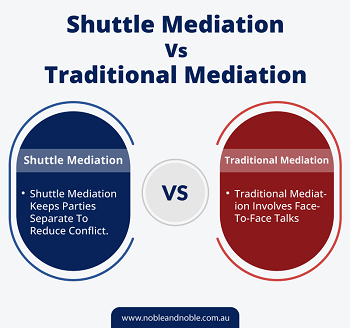 Differences Between Shuttle Mediation and Traditional Mediation[/caption]
Differences Between Shuttle Mediation and Traditional Mediation[/caption]
Traditional mediation involves all parties meeting together in the same room, with the mediator facilitating the discussion to help reach an agreement. This method encourages direct communication and collaboration between the parties involved.
Shuttle mediation, on the other hand, keeps the parties in separate rooms, with the mediator moving between them to convey messages and proposals. This approach can reduce tension and conflict, creating a more structured and less confrontational environment for negotiations.
Benefits and Drawbacks of Shuttle Mediation
Shuttle mediation offers several benefits, including reducing emotional stress, allowing for private discussions, and creating a more controlled environment.
However, it also has drawbacks, such as potentially longer sessions and the need for a skilled mediator to manage the process effectively. Understanding these pros and cons can help parties decide whether shuttle mediation is the right choice for their situation.
Legal Framework in Australia
Overview of Mediation Laws
Mediation in Australia is governed by a combination of federal and state laws, which provide a framework for how mediation processes should be conducted. These laws ensure that mediation is a fair and equitable process, with specific regulations for different types of disputes, including family law, commercial conflicts, and workplace issues.
Specific Regulations Governing Shuttle Mediation
While shuttle mediation falls under the general mediation laws, there are specific guidelines and best practices that mediators follow to ensure the process is effective. These include rules about confidentiality, the mediator's neutrality, and the proper conduct of the mediation sessions. In 2024, there have been updates to these regulations to address the growing use of shuttle mediation in various legal contexts.
Recent Changes in 2024
The year 2024 has seen several significant updates to Australia's mediation laws, particularly concerning shuttle mediation. These changes reflect the increasing demand for this method in resolving disputes, particularly in family law and commercial settings. The new regulations aim to streamline the process, improve outcomes, and ensure that all parties have access to fair mediation.
When to Use Shuttle Mediation
Common Situations Where Shuttle Mediation is Beneficial
Shuttle mediation is particularly useful in situations where direct communication between parties is either impossible or undesirable. This includes cases involving high-conflict divorces, disputes with significant power imbalances, or situations where one party feels threatened by the other. By keeping the parties apart, shuttle mediation can help to create a safer and more productive negotiation environment.
Family Law Disputes
In family law, shuttle mediation is often used in divorce or child custody cases where emotions run high. The process allows both parties to communicate their needs and concerns without the stress of direct confrontation, making it easier to reach a fair agreement.
Commercial Disputes
Shuttle mediation is also effective in resolving commercial disputes, particularly when there are complex issues at stake or when relationships between the parties have deteriorated. By separating the parties, the mediator can help to focus on the issues at hand and work towards a mutually acceptable resolution.
Workplace Conflicts
In the workplace, shuttle mediation can be used to address conflicts between employees or between employees and management. This method is particularly useful in cases where ongoing relationships need to be preserved, as it allows for a resolution without direct confrontation.
The Shuttle Mediation Process
[caption id="attachment_2593" align="alignright" width="350"]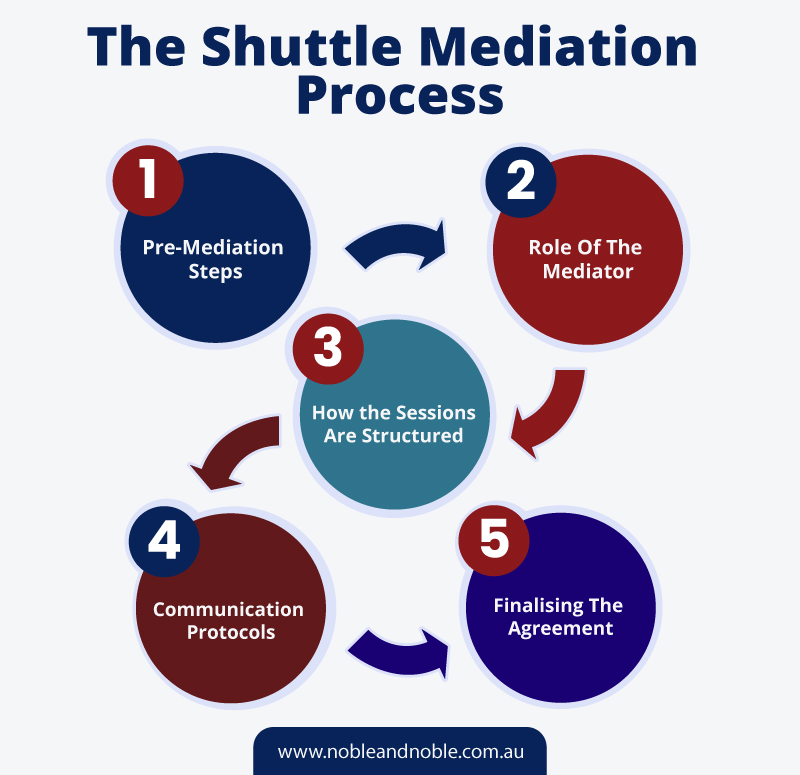 The Shuttle Mediation Process
The Shuttle Mediation Process
Pre-Mediation Steps[/caption]
Pre-Mediation Steps
Before shuttle mediation begins, several steps need to be taken. These include selecting a mediator, preparing a mediation agreement, and gathering necessary documentation. The mediator will also conduct pre-mediation interviews with each party to understand their concerns and objectives.
Role of the Mediator
The mediator plays a crucial role in shuttle mediation, acting as an impartial facilitator who helps the parties communicate and negotiate. The mediator's responsibilities include ensuring that the process is fair, managing the flow of information between the parties, and helping to craft a mutually acceptable agreement.
How the Sessions Are Structured
Shuttle mediation sessions typically follow a structured format. Each party will have private meetings with the mediator, during which they can express their concerns and make offers. The mediator then relays this information to the other party, facilitating a back-and-forth negotiation process. This continues until an agreement is reached or the mediation ends without resolution.
Communication Protocols
Effective communication is key to successful shuttle mediation. The mediator must ensure that all communications are clear, concise, and accurately conveyed between the parties. Confidentiality is also critical, as it allows parties to speak freely without fear that their words will be used against them later.
Finalising the Agreement
If the parties reach an agreement, the mediator will help them draft a formal settlement document. This agreement is legally binding and can be enforced by the courts if necessary. If no agreement is reached, the parties may choose to pursue other forms of dispute resolution or take their case to court.
Roles and Responsibilities
Mediator's Responsibilities
The mediator is responsible for facilitating the mediation process, ensuring fairness, and helping the parties reach a mutually acceptable agreement. This involves managing communication, keeping the parties focused on the issues, and ensuring that the mediation sessions are productive.
Participants' Roles
The participants in shuttle mediation have a responsibility to engage in the process in good faith. This means being open to negotiation, listening to the mediator, and working towards a fair resolution. Participants should also be prepared to provide all necessary documentation and information to support their case.
Legal Representatives' Involvement
In some cases, parties may choose to have legal representatives involved in the shuttle mediation process. These representatives can provide legal advice, help to draft the settlement agreement, and ensure that their clients' rights are protected throughout the process.
Preparing for Shuttle Mediation
What to Expect
Participants in shuttle mediation should be prepared for a process that may take several sessions to complete. The mediator will work with each party separately, which can make the process longer than traditional mediation. However, the separation can also make it easier to reach a fair agreement.
Tips for Effective Preparation
To prepare for shuttle mediation, participants should gather all relevant documentation, think about their goals for the mediation, and be ready to discuss their concerns and interests with the mediator. It can also be helpful to discuss the process with a legal representative or mediator beforehand to ensure that you are fully prepared.
Gathering Necessary Documentation
Having the right documentation is crucial for a successful shuttle mediation. This may include financial records, contracts, emails, or other relevant documents that support your position. Being well-prepared can help to streamline the mediation process and improve your chances of reaching a favourable outcome.
Costs and Fees
Typical Costs of Shuttle Mediation
The costs of shuttle mediation can vary depending on the complexity of the case, the mediator's fees, and the number of sessions required. Typically, parties can expect to pay between AUD 2,000 and AUD 5,000 for a complete mediation process, although costs can be higher for more complex cases.
Factors Influencing Costs
Several factors can influence the cost of shuttle mediation, including the mediator's experience, the length of the mediation, and whether legal representatives are involved. It is important to discuss costs upfront with the mediator and ensure that you understand all potential fees before the process begins.
Funding and Legal Aid Options
In some cases, parties may be eligible for legal aid or other funding to help cover the costs of shuttle mediation. This is particularly true in family law cases, where the government may provide assistance to help parties resolve their disputes without going to court.
Expert Insights
Quotes from Leading Mediators in Australia
"Shuttle mediation has become an invaluable tool in the dispute resolution landscape, particularly for cases where direct communication is not feasible." - Jane Doe, Senior Mediator
"While shuttle mediation can be more time-consuming, the ability to manage high-conflict situations makes it a preferred choice in many cases." - John Smith, Family Law Mediator
Common Challenges and Solutions
One of the common challenges in shuttle mediation is ensuring that both parties remain engaged in the process, even when they are not directly interacting. Mediators must be skilled in maintaining momentum and keeping the parties focused on reaching an agreement. Another challenge is managing the emotional aspects of the dispute, which can be more pronounced in shuttle mediation. Experienced mediators use techniques such as active listening and reframing to address these challenges.
Practical Tips
How to Get the Most Out of Shuttle Mediation
To make the most of shuttle mediation, it is important to enter the process with an open mind and a willingness to negotiate. Be prepared to listen to the mediator's advice, consider the other party's perspective, and focus on finding a mutually acceptable solution. It is also important to stay patient, as shuttle mediation can take time, but the results are often worth the effort.
Avoiding Common Pitfalls
Some common pitfalls in shuttle mediation include becoming too entrenched in your position, refusing to compromise, and not preparing adequately for the sessions. To avoid these issues, it is important to remain flexible, communicate openly with the mediator, and take the time to prepare thoroughly before the mediation begins.
Shuttle mediation is a powerful tool for resolving disputes, particularly in high-conflict situations where direct communication is not feasible. By keeping the parties separated, shuttle mediation allows for a more controlled and focused negotiation process, leading to fair and mutually acceptable outcomes. Whether you are involved in a family law dispute, a commercial conflict, or a workplace issue, shuttle mediation can provide an effective way to resolve your differences without the need for litigation.
Frequently Asked Questions (FAQs)
What is Shuttle Mediation?
Shuttle mediation is a form of mediation where the mediator moves between parties who are in separate rooms, facilitating communication and negotiation.
How is it Different from Traditional Mediation?
Unlike traditional mediation, where all parties meet together, shuttle mediation keeps the parties physically apart, reducing tension and allowing for a more controlled negotiation process.
Is Shuttle Mediation Legally Binding?
If an agreement is reached during shuttle mediation, it can be drafted into a legally binding settlement that is enforceable by the courts.
How Long Does Shuttle Mediation Take?
The length of shuttle mediation can vary depending on the complexity of the case, but it typically requires several sessions to complete.
What Happens if Shuttle Mediation Fails?
If shuttle mediation does not result in an agreement, the parties may choose to pursue other forms of dispute resolution, such as arbitration or litigation.
How Much Does Shuttle Mediation Cost?
The cost of shuttle mediation can vary, but it typically ranges from AUD 2,000 to AUD 5,000, depending on the complexity of the case and the mediator's fees.
Need Help ?
If you need help, feel free to Contact Us at any time at Noble & Noble Mediations. We have qualified mediators ready to help.
Find Qualified Brisbane Mediators at Noble & Noble Mediations on google maps.
You also like to learn more about:
The Evolution of Shuttle Mediation in Australia: A Comprehensive Guide
The Evolution of Shuttle Mediation in Australia
In the complex and often emotionally charged realm of family disputes, finding effective ways to resolve conflicts without escalating tensions is essential. One method that has gained prominence in Australia is shuttle mediation, a process designed to facilitate discussions between parties who might not be able to face each other directly. At Noble & Noble Mediations, we have honed our expertise in shuttle mediation to offer our clients a process that is not only efficient but also sensitive to the unique dynamics of family disputes.
What is Shuttle Mediation?
[caption id="attachment_2585" align="alignright" width="350"]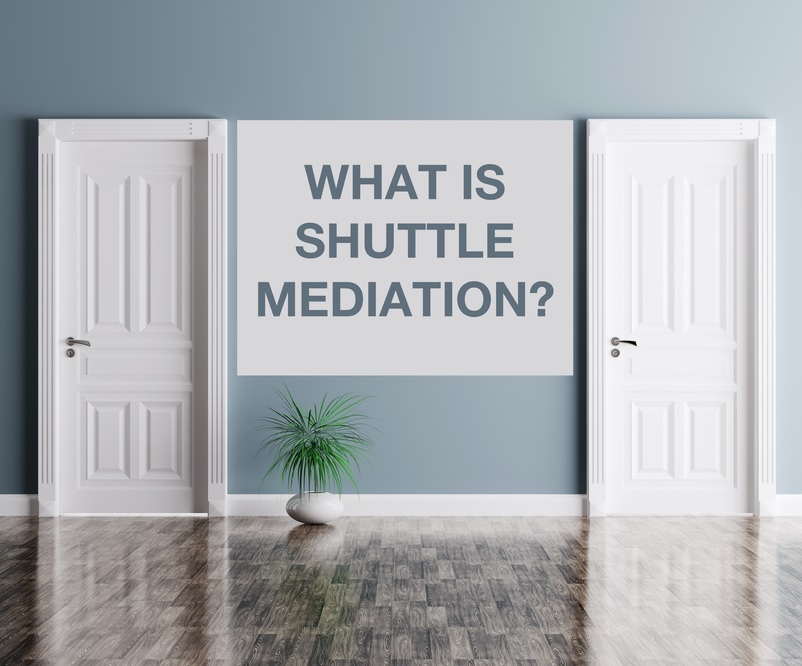 What is Shuttle Mediation?[/caption]
What is Shuttle Mediation?[/caption]
Shuttle mediation is a form of dispute resolution where the mediator moves back and forth between the parties involved, who are in separate rooms or locations, to relay offers, counteroffers, and messages. This approach is particularly beneficial when there is a significant level of conflict or when the parties feel uncomfortable or unsafe being in the same room.
The process is designed to reduce the stress and emotional strain that can accompany direct negotiations, allowing each party to communicate their concerns and needs without the added pressure of facing the other party directly. This method is especially common in family law matters such as divorce, child custody, and property settlements, where emotions often run high.
The Legal Framework for Shuttle Mediation in Australia
In Australia, the legal framework for mediation, including shuttle mediation, is largely governed by the Family Law Act 1975. This Act emphasises the importance of mediation as a tool for resolving family disputes outside the court system. The Act encourages parties to engage in mediation before resorting to litigation, promoting the use of mediation to reach amicable agreements.
The Family Law (Family Dispute Resolution Practitioners) Regulations 2008 further establish the qualifications and standards required for mediators, ensuring that those who practise shuttle mediation are adequately trained and equipped to handle sensitive family matters. At Noble & Noble Mediations, our mediators meet these stringent standards, offering our clients the highest level of expertise and professionalism.
When Is Shuttle Mediation Appropriate?
Shuttle mediation is particularly useful in situations where direct communication between the parties is likely to be counterproductive. This can include cases where there has been a history of domestic violence, where one or both parties are highly emotional, or where there is a significant power imbalance that might prevent one party from negotiating freely.
In such cases, shuttle mediation allows each party to express their concerns and negotiate terms without the fear of intimidation or confrontation. The mediator acts as a neutral intermediary, ensuring that the process remains fair and balanced.
The Role of the Mediator in Shuttle Mediation
Facilitating Communication:
- The mediator acts as an intermediary, relaying information between the parties who are in separate rooms.
- They ensure that communication is clear and that each party’s concerns and proposals are accurately conveyed.
Managing Emotions:
- The mediator helps manage emotions and tension, creating a calm environment where both parties can focus on resolving their dispute.
- They work to prevent emotional outbursts from derailing the process.
Ensuring Fairness:
- The mediator ensures that both parties have an equal opportunity to present their views and that neither party dominates the discussion.
- They strive to create a balanced process where both parties feel heard and respected.
Identifying Common Ground:
- The mediator identifies areas of agreement and helps the parties build on these to move closer to a resolution.
- They work to find common interests that can serve as the foundation for an agreement.
Keeping the Process on Track:
- The mediator maintains the momentum of the mediation, ensuring that discussions remain focused on resolving the issues at hand.
- They manage the timing and pace of the sessions to prevent unnecessary delays.
Handling Power Imbalances:
- The mediator addresses any power imbalances between the parties to ensure a fair process.
- They may adjust the mediation approach to accommodate the needs of a less assertive party.
Encouraging Concessions:
- The mediator encourages both parties to make reasonable concessions to reach a mutually acceptable agreement.
- They guide the parties towards compromise without pressuring them to settle.
Maintaining Confidentiality:
- The mediator ensures that all information shared during shuttle mediation remains confidential.
- They respect the privacy of both parties, fostering a safe space for open discussion.
The Benefits of Shuttle Mediation
Shuttle mediation offers several advantages, particularly in family law disputes. One of the primary benefits is that it allows the parties to negotiate in a less confrontational setting. This can be especially important in cases involving children, where maintaining a cordial relationship between the parents is crucial for the well-being of the child.
Another significant advantage is the ability to negotiate at a pace that suits both parties. Because the mediator moves between the parties, there is often more time for each party to reflect on the offers and counteroffers being made, reducing the likelihood of impulsive decisions that might later be regretted.
Additionally, shuttle mediation can be more cost-effective than traditional mediation or litigation. Because the process is often quicker and less formal, it can reduce the overall costs associated with resolving the dispute. At Noble & Noble Mediations, we are committed to offering our clients high-quality mediation services at a lower cost, ensuring that everyone has access to the legal support they need.
The Challenges of Shuttle Mediation
Time-Consuming Process:
- Shuttle mediation can be time-consuming, especially if the parties have significantly different positions.
- The mediator must manage the flow of information carefully, ensuring that neither party feels isolated or ignored, which can require considerable time and effort.
Risk of Delaying Tactics:
- One party may use shuttle mediation to delay proceedings or avoid making concessions.
- It is crucial to have an experienced mediator who can recognize and address these tactics promptly.
Importance of Experienced Mediators:
- An experienced mediator is essential in keeping the process on track.
- At Noble & Noble Mediations, our mediators ensure that both parties remain engaged and focused on reaching a resolution.
The Future of Shuttle Mediation in Australia
As the legal landscape in Australia continues to evolve, the use of shuttle mediation is likely to increase. The emphasis on alternative dispute resolution methods reflects a broader shift towards more collaborative and less adversarial approaches to family law. At Noble & Noble Mediations, we are at the forefront of this shift, offering innovative mediation services that meet the needs of modern families.
With advancements in technology, shuttle mediation is also becoming more accessible. Online mediation platforms allow parties to participate in shuttle mediation from different locations, making it easier for those who are unable to travel or who prefer the convenience of online communication. This flexibility is particularly valuable in today's fast-paced world, where time and convenience are often at a premium.
Noble & Noble Mediations: Your Partner in Resolving Family Disputes
At Noble & Noble Mediations, we understand that every family dispute is unique, and we tailor our mediation services to meet the specific needs of our clients. Whether you are dealing with a complex property settlement, child custody issues, or any other family law matter, our experienced Brisbane mediators are here to help.
We pride ourselves on offering a service that is not only professional but also compassionate and client-focused. Our commitment to using the latest technology and innovative practices ensures that our clients receive the best possible service at a cost they can afford.
Frequently Asked Questions
What is shuttle mediation, and how does it differ from traditional mediation?
Shuttle mediation is a process where the mediator moves between the parties, who are in separate rooms or locations, to relay messages and negotiate terms. Unlike traditional mediation, where parties are often in the same room, shuttle mediation reduces direct confrontation and is ideal for situations where there is high conflict or emotional tension.
Is shuttle mediation legally binding in Australia?
Yes, agreements reached through shuttle mediation can be legally binding if both parties agree to the terms and sign a written agreement. This agreement can then be submitted to the court for approval, making it enforceable under Australian law.
Who can benefit from shuttle mediation?
Shuttle mediation is particularly beneficial for parties involved in family disputes, such as divorce or child custody issues, where emotions run high, or where there is a history of domestic violence. It allows for a more controlled and less confrontational negotiation process.
How long does shuttle mediation usually take?
The duration of shuttle mediation varies depending on the complexity of the issues involved and the willingness of the parties to negotiate. Some disputes can be resolved in a few hours, while others may take several sessions.
What are the costs associated with shuttle mediation?
The costs of shuttle mediation are generally lower than those of traditional mediation or litigation. At Noble & Noble Mediations, we strive to offer affordable mediation services, with fees that are based on the complexity of the case and the time required to reach a resolution.
Can shuttle mediation be conducted online?
Yes, shuttle mediation can be conducted online, allowing parties to participate from different locations. This is particularly useful for those who are unable to travel or who prefer the convenience of online communication.
Shuttle mediation is a valuable tool in the landscape of family dispute resolution in Australia. By allowing parties to negotiate in a more controlled and less confrontational setting, it offers a path to resolution that is both effective and sensitive to the needs of those involved.
At Noble & Noble Mediations, we are committed to providing the highest level of service to our clients, helping them navigate the complexities of family law with confidence and peace of mind. Whether you are facing a difficult divorce, a child custody dispute, or any other family law issue, we are here to help you find a resolution that works for you.
Need Help ?
If you need help, feel free to Contact Us at any time at Noble & Noble Mediations. We have qualified mediators ready to help.
Find Qualified Brisbane Mediators at Noble & Noble Mediations on google maps.
You also like to learn more about:
Evolution of Mediation
What are Mediations?
 Mediation has grown rapidly across the world since the 1960s. Australia has become a global leader in mediation law and practice, readily embracing new technology and new ideas. Mediation is a process in which parties, with the assistance of a mediator, identify the issues in dispute and endeavour to reach an agreement.
Mediation has grown rapidly across the world since the 1960s. Australia has become a global leader in mediation law and practice, readily embracing new technology and new ideas. Mediation is a process in which parties, with the assistance of a mediator, identify the issues in dispute and endeavour to reach an agreement.
The Noble Park Centre was one of the first mediation programs funded by the Commonwealth Government. In 1989, the Centre recorded that 72 mediations were conducted. At this stage, professional standards, guidelines and accredited regimes were yet to be introduced.
Court-based mediation was introduced by the Victorian County Court in 1983. The Federal Court of Australia followed suit and introduced a mediation program for alternative dispute resolution in 1987. In 1991, the Federal Court of Australia Act 1976 was amended to allow the Court, with consent of the parties, to refer the proceeding to a mediator.
As summarised by Barrister David Paratz, mediation was a new philosophy focusing on cooperative problem-solving in place of the old combat model where parties were pitted against each other. Practitioners had little choice but to readily embrace the rise of mediation otherwise they would be left behind.
Why is Mediation Preferred?
Mediation is now the preferred, cheaper and quicker alternative to litigation in Australia. The majority of Australia laws facilitate, even mandate mediation prior to commencing court proceedings. In Family Law, mediation is a mandatory pre-action procedure for parenting matters pursuant to section 60I of the Family Law Act 1975. There are exemptions to this requirement based on urgency, family violence and/or child abuse. Outside of the Court, many private organisations and institutions offer mediation services for any kind of dispute.
As one of the most litigious societies in the world, mediators are continuously exploring new and creative styles of mediation. Some examples include:
- Transformative mediation – the mediator focuses on empowering parties to resolve their conflict and encouraging them to recognise each other’s needs and interests. This is an ambitious style of mediation, aiming to transfer the relationship of the parties through the process of acquiring the skills they need to make constructive change.
- Narrative mediation – this is a modern form of mediation where the primary focus of the mediator is on fixing the relationship between parties and then resolving the dispute following that.
- Online mediation – this form of mediation utilises online or web-based technologies to assist in the resolution of disputes. The process usually involves a third party whose role is to adopt facilitative, advisory or determinative approaches. However, the third party role is often assumed by online computer-based software or other artificial intelligence that do not involve a ‘human’ practitioner. While Australia is still warming to the idea of online mediation, mediators are ready to support and foster the development of this new technology.
If you are ready to participate in mediation and reach a timely and fair outcome with your ex-partner, please contact the team at James Noble Law today for a free, no-obligation 20 minute consultation.
Need Help ?
Contact Brisbane Mediators now. Or choose a package to suit your requirements, “Noble and Noble Mediations” offer convenient set Price Packages at half day or full day rates, which cover full cost of mediation and amenities on the day. Simple.
Find Best Family Mediators in Brisbane on Google Maps near you now.
Learn more about other resource
Shuttle Mediations – What are they and why use them?
What is Shuttle mediations in Brisbane? Why use them?

If you and your partner have just recently separated you are likely to have lots of questions about the next steps and what the future may look like for you and your family.
Mediation can often be a good starting point and a highly effective method of alternative dispute resolution to discuss, negotiate and hopefully resolve your family law matter. If you have a parenting dispute, you are required to attend some form of dispute resolution prior to commencing Court proceedings. If you already have Court proceedings on foot, the Court will also likely make Orders for the parties to attend mediation before setting the matter down for a trial or final hearing.
At Noble and Noble Mediations we offer cost effective mediation options to parties (either with or without their solicitors) to negotiate all types of family law disputes including parenting arrangements and property settlements.
One of the popular forms of mediation we offer at Noble and Noble Mediations is what is commonly referred to as a “shuttle mediation”. A shuttle mediation involves the mediation occurring without the parties coming into direct contact or communication with each other. The parties are seated in separate rooms with the mediator effectively “shuttling” back and forth between them to communicate a parties’ position and to exchange offers of settlement.
Shuttle mediations can be useful in a number of family law matters such as:
- Where there may be a power imbalance between the parties;
- Where there has beena history of domestic violence;
- Where there is a high level of conflict between the parties;
- Where one party is struggling with the emotions associated with the separation; or
- Where communication between the parties has broken down and become strained following the breakdown of the relationship.
 Shuttle mediation can therefore be successful with the mediator taking on a primary role in facilitating the negotiations, identifying the issues, developing options, encouraging alternatives and supporting the parties to reach an agreement that they are satisfied with to end the dispute.
Shuttle mediation can therefore be successful with the mediator taking on a primary role in facilitating the negotiations, identifying the issues, developing options, encouraging alternatives and supporting the parties to reach an agreement that they are satisfied with to end the dispute.
In determining whether a shuttle mediation may be useful for your family law matter, it is important to remember that as you will not be coming into direct contact with the other party, there will not be an opportunity for you to directly address them and for them to hear and acknowledge your concerns. However, the mediator can relay this information to the other party as part of facilitating the negotiations.
Mediators conducting shuttle mediations will often have what is referred to as a “pre-mediation intake session”. During this session the mediator will meet with each party one-on-one and separately to establish a relationship with the parties, to have knowledge of the background to the dispute, to understand what is important to the parties, what their goals for the mediation are and what their needs for the mediation are.
Our highly experienced mediators at Noble and Noble Mediations are also solicitors who specialize in the area of family law with a significant background and experience with these matters. We offer either a half day or full day mediation, complete with refreshments and with or without solicitors, depending on your preference and requirements.
Need Help ?
Contact Brisbane Mediators now. Or choose a package to suit your requirements, “Noble and Noble Mediations” offer convenient set Price Packages at half day or full day rates, which cover full cost of mediation and amenities on the day. Simple.
Find Best Family Mediators in Brisbane on Google Maps near you now.
Learn more about other resource
The boom of remote mediation during the COVID-19 pandemic and what the future holds
Remote Mediation during the COVID-19 pandemic and what the future holds?

As we edge closer to a post-COVID world, mediators are embracing remote mediation as the new norm. After all, the traditional method of face-to-face mediation is not always feasible.
Remote mediation provides for a more effective solution by opening mediation to a larger audience and most importantly, generating significant cost saving for all involved during an emotional and difficult time. In circumstances where a Protection Order is in place, remote mediation fosters a safe environment for parties to work towards resolving matters in dispute.
As families continue to be separated as a result of prolonged boarder closures or simply physical distance, remote mediation enables mediations to take place where parties are based in different parts of the world, or just in different states in the same country as we have become familiar with in Australia.
Why is Remote Mediation important?

Often, being in different parts of the world means the parties will be in completely different time zones. In this instance, remote mediation offers parties the flexibility to participate in a series of short sessions instead of a long single mediation session.
The flexibility in terms of time and location alleviates some of the pressure associated with traditional mediations, thereby encouraging a more organic conversation between the parties. By providing an ease of accessibility and flexibility, remote mediation also reduces delays and enables parties to reach a resolution sooner.
Unsurprisingly, face-to-face mediation can be costly. The additional costs usually stem from room hire, travel expenses and travel time incurred. Remote mediation offers the luxury of mediating from home or at a beneficial location, meaning these costs are avoided entirely. Instead of watching the clock at 5:00pm wondering if you will make the train, parties will be comfortable and focused until a settlement is reached.
The savings in travel costs are complemented by the savings in electronic bundles. Before mediation even begins, documents need to be exchanged with the mediator and other parties. Let’s remind ourselves about the length of legal documents. Printing lengthy documents only adds another expense for the client. By moving to electronic bundles, parties are saving money and all of the appropriate documents are available to review and refer to at any point during the process.
Resolving conflict can be particularly difficult in circumstances where a Protection Order is in place. If one party feels empowered to be more dominating and intimidating, the mediation will almost certainly derail without a fair outcome. By separating parties virtually, remote mediation eliminates the stress and fear associated with face-to-face discussions. There is also no possibility of parties running into each other during scheduled breaks in communal areas of the building, such as the cafeteria, lifts or bathrooms.
How do mediators feel about remote mediation?
Remarkably, over 80% of online mediators describe their experience as positive. Online mediators have also reported an 81% improvement in access to participants, an 80% improvement in time efficiency and a 72% improvement in cost efficiency. Parties can have peace of mind in knowing that remote mediation has not sparked a noticeable change in settlement rates. From a mediator's perspective, parties often appear more relaxed, engaged and safe during remote mediations.
At Noble & Noble Mediations, we recognize the importance of evolving with technology for our clients. Remote mediation is an option that produces timely, cost effective and safe outcomes. The flexibility afforded to all parties of remote meditation encourages issues to be resolved without recourse to litigation. If you need assistance, please feel free to contact our qualified mediators at any time.
Need Help ?
Contact Brisbane Mediators now. Or choose a package to suit your requirements, "Noble and Noble Mediations" offer convenient set Price Packages at half day or full day rates, which cover full cost of mediation and amenities on the day. Simple.
Find Best Family Mediators in Brisbane on Google Maps near you now.
Learn more about other resource
What Is The Difference Between Collaborative Law and Collaborative Mediation?
Collaborative Law and Collaborative Mediation
A most important difference between collaborative mediation and collaborative law is how lawyers participate and what happens if the spouses do not resolve all their issues.
As mentioned above, collaborative law requires spouses to have collaborative divorce lawyers whom they must replace if the spouses are not successful in settling everything in the collaborative law process.
In contrast, a party to collaborative mediation is not required to have legal counsel. A spouse who does have a divorce lawyer, on the lawyer's advice and using his or her own good judgment, can decide if the divorce lawyer will attend one or more collaborative mediation sessions.

The client may decide instead to ask the lawyer to assist offline to counsel him or her toward an amicable resolution, develop options, review agreements, and do legal paperwork. If there is no settlement in collaborative mediation, the spouses may continue to use the same lawyers throughout, even if their lawyers are trained in collaborative law.
Having control over the involvement of the lawyers in collaborative mediation significantly improves the couple's ability to control the cost of the divorce. For those clients who fear lawyers will "stir the pot", their ability to decide the lawyer's role in collaborative mediation ensures that any conflict will be of their own creation, not their lawyer's.
In summary, savvy divorcing families, collaborative lawyers, divorce financial advisors, judges, counselors, and other professionals whose practices serve families have applauded collaborative mediation as a fresh innovation in cost effective, client-centered, family-friendly divorce.
Collaborative mediation has proven itself to be an attractive new solution for divorcing spouses who want to focus toward positive independent lives with their emotional and financial stability - and their family - still intact. For divorce and family professionals, it has also opened the door to a more fulfilling and satisfying practice.
Need Help ?
If you need help, feel free to Contact Us at any time at Noble & Noble Mediations. We have qualified mediators ready to help.
Call Us for 24/7 support – 0497 434 460
Find Qualified Brisbane Mediators at Noble & Noble Mediations on google maps.
You also like to learn more about:
More blog posts
What’s The Lighthouse Project effect in Brisbane, Australia 2021?
The Lighthouse Project came into effect in the Brisbane Registry of the Family and Federal Circuit Court of Australia in early 2021. It is a pilot program designed to assist



